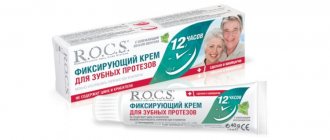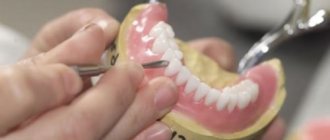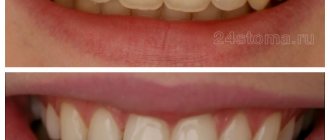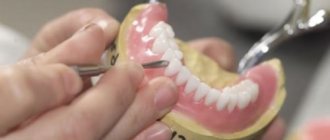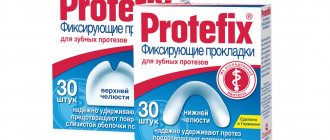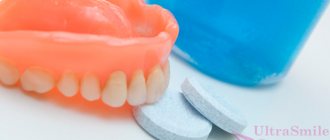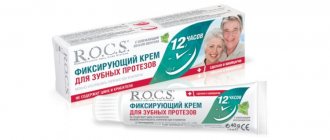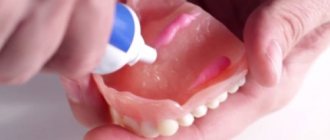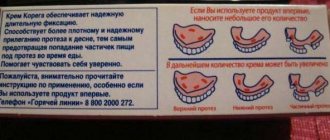Review of the best creams for fixing dentures: features of composition and application
Article navigation
- Why do we need fixing agents for dentures?
- The main components of creams that provide fixation
- Rating of the best creams
- 1. “Fittident” (Austria)
- 2. "Rox" (Switzerland)
- 3. "President" (Italy)
- 4. "Protefix" (Germany)
- 5. “Lakalut” (Germany)
- 6. Corega (Ireland)
- How to choose the most suitable product
- How to use the composition correctly
- Side effects of using the compounds
Question for a specialist
Most removable dental structures are attached to the soft tissue of the gums and palate. To prevent their loss, ensure reliable fixation and full performance of their intended functions, use denture cream. The product is suitable for wearing acrylic, nylon and silicone products. About which cream for dentures is better, the features of choice and the nuances of use later in the article.
Which cream to choose for fixing dentures
A person who is faced with prosthetics faces a long adaptation to removable structures, which is accompanied by a lot of inconvenience. Special fixing creams will help prevent excessive mobility, painful pressure on the gums and food particles getting under the denture. In addition, many of them relieve associated dental problems:
1. Flavored fixatives will help cope with bad breath. When salivating, they refresh the oral cavity and have a bactericidal effect.
2. If you have increased salivation, give preference to products with extra strong hold. Such products will prevent premature dissolution of the cream and ensure reliable attachment of dentures to the gums throughout the day.
3. Are your gums painful and bleeding? Fixative creams for sensitive gums will help strengthen and reduce pressure on soft tissues. They have antiseptic, protective, restorative and strengthening properties, and also prevent periodontal disease and other dental diseases.
Recommendations: 10 best medicated toothpastes
12 best gels to make teething easier
9 best dentures
Why do we need fixing agents for dentures?
Cream for dentures provides not only reliable fastening of the product in the oral cavity. At the same time it performs the following functions:
- accelerates adaptation to the design, since it eliminates chafing of the mucous membrane,
- prevents the accumulation of food masses between the product and the gums, because adheres to the mucous membrane more tightly,
- provides protection of the mucous membrane from the mechanical impact of the prosthetic structure - you will experience less pain and discomfort, both at rest and when eating,
- prevents gum inflammation (some products contain anti-inflammatory components),
- Gives freshness to your breath thanks to the additives included in the composition (not all).
Don't know what type of prosthetics to choose?
We will help in the selection, advise where to read more information and compare types of prosthetics.
Consultation with an orthopedic doctor in Moscow clinics is free! Call now or request a call
Working hours: from 9:00 to 21:00 - seven days a week
Review of effective remedies
On pharmacy shelves today, the range of fixing compounds for dentures is very huge. To somehow make choosing the right cream easier, let’s take a closer look at popular manufacturers.
Corega
The tube in which the cream is stored has a fairly convenient tip. During its development, components such as paraffin, zinc, gum and petrolatum were used. All of them do not have a detrimental effect on health. The manufacturer offers its customers the following types of Corega glue:
- strong hold,
- refreshing.
When applied, reliable fixation of the structure in the oral cavity is achieved for 24 hours. Thus, it is possible to prevent food from getting under the denture and reduces the risk of inflammation of the oral mucosa. The advantages of the product include:
- affordable price;
- ease of use;
- can be used for wet structures.
The disadvantages include:
- can be removed very quickly with water;
- after prolonged wear, swelling of the mucous membrane may occur;
- When eating, the denture may fall out of the mouth, as the cream dissolves under the influence of food and drinks.
Protefix
The cream guarantees reliable fixation of dentures for 10-12 hours. The manufacturer sells the following types of product: hypoallergenic without fragrances and dyes, and also with ingredients such as aloe and mint.
The popularity of Protefix cream is associated with the following set of positive qualities:
- efficiency;
- high fixing qualities;
- no pungent odor or taste.
Glue for attaching dentures is not without its disadvantages, namely:
- the tube contains a small amount of liquid;
- the dispenser does not facilitate convenient application;
- the bottle must be in a vertical position so that the product does not leak out.
Fittydent
Fittident is not suitable for patients who have increased sensitivity. It may cause a tingling and burning sensation in the gums when applied. To eliminate discomfort, you should wait for the glue to dry a little on the structure itself, and only then attach it.
The advantages of the product include:
- after removal there are no traces of glue on the gums;
- there is no pronounced taste;
- reliable fixation is achieved.
The disadvantages of glue are as follows:
- viscous consistency;
- it is necessary to distribute the glue only on a dry structure;
- high availability.
The president
After applying the cream, a dense film is formed on the surface of the structure. It protects against food debris getting under the denture base. When developing the product, components such as flavorings and petroleum jelly were used. The fixation is weakened by eating hot food.
The benefits of the cream include:
- reliable fixation;
- affordable price;
- Compared to other products, the volume of the cream is 10 ml more.
Disadvantages cannot be excluded, which include:
- specific aroma;
- When eating, the fixation weakens.
Lakalut
This product was developed by German specialists. It is of high quality and allows for reliable fixation for 24 hours. After application, a thin layer is formed between the mucous membrane and the prosthesis, which serves as reliable protection against chafing and the development of inflammation.
The advantages of the product include:
- pleasant aroma and taste;
- reliable fixation;
- protection of the mucous membrane from chafing.
The disadvantages include:
- high price;
- When drinking hot drinks and food, the fixation weakens.
Forest balm
This luting agent can be used for complete and partial dentures. When applied, excellent fixation is achieved even while eating. The product is based on an anti-inflammatory complex made from natural ingredients: chamomile and rosehip oil, which effectively stop the inflammatory process. The tube containing the cream is equipped with a narrow spout for easy application of the product.
Rocks
Rox is a fixing agent produced in Russia. Reliable fixation lasts for 12 hours. The product can be used for attaching removable crowns and structures. The consumption of the cream is very economical, one tube is enough for 2 months. There are no dyes in the composition, fresh breath is achieved.
Correct use of cream
To obtain a comfortable fixation of the structure, it is necessary to follow certain rules for using the cream. These include the following:
- Before applying the product, the denture must be clean and dry. After each use of the product, it must be cleaned of plaque, glue residues and food. Before fixing, go over with a brush and cotton wool soaked in a special solution. Wash the denture with water and wait until it dries.
- Distribute the glue pointwise into the required recess of the structure. Place it in place in the mouth and close your jaws for a couple of seconds.
- After this procedure, it is forbidden to eat or drink for 30 minutes. It is not necessary to remove the structure overnight. If it is securely fixed, then you can go to bed with it. Just apply the product in small quantities next time.
- The fixative should be stored in a tightly sealed package.
The main components of creams that provide fixation
Almost all creams for fixing removable dentures have a similar composition, differing only in some components. For example, substances of natural origin (plant and/or animal) may be added to them. Many manufacturers add aromatic ingredients to improve the taste of the product and ensure freshness in the mouth.
It is important to know! For people prone to allergic reactions, it is better to purchase creams for attaching dentures that have a neutral, hypoallergenic composition. Some manufacturers produce different series of products that allow you to choose the best option. Pay attention to flavoring additives - most often it is mint, eucalyptus, less often - citrus fruits and even chocolate.
Many creams that provide reliable fixation of removable dental structures contain zinc. Its presence allows you to achieve the most durable adhesion of surfaces. And at the same time, it has an excellent wound-healing effect - useful if new teeth are chafed. Many people are afraid to use products with zinc. However, its negative effect on the body occurs mainly in case of ingestion. Therefore, it is important to use this drug correctly: apply only once a day and in small quantities.
What is prosthetic glue and what is it used for?
Fixation of removable dentures occurs due to anatomical retention - compliance of the shape of the inner surface of the product with the anatomical features of the jaw. When a person puts on a prosthesis, a vacuum is created between the structure and the jaw, which holds the base. However, with prolonged wearing of prostheses, many people experience atrophy of the alveolar processes, which reduces the strength of fixation of orthopedic products.
Dentists recommend securing dentures using fixing creams and gels; the use of such products is especially necessary in cases of complete absence of teeth. They strengthen the vacuum between the mucous membrane of the gums and the structure and thereby hold it securely.
Special fixing glue is available in the form of cream, gel, paste. The advantages of such funds include:
- strong fixation of the structure to the gum mucosa;
- holding the prosthesis while smiling, talking, eating;
- product stabilization;
- protection of the mucous membrane from rubbing, damage, inflammation;
- hypoallergenic;
- biocompatibility with the body;
- uniform distribution of load on the gums;
- lack of specific taste and smell;
- psychological comfort of the patient;
- no fear that the prosthesis may become mobile at the wrong time;
- can be used for all types of structures (plastic, nylon).
Cream or gel for fixing dentures - differences
Creams and gels are practically no different from each other, the difference between them lies only in consistency. Creams are dense and viscous, while products in the form of a gel have greater fluidity, due to which they are applied in a thinner layer.
At the initial stages of using a prosthesis, it is better to use fixatives in the form of a cream, as they provide easier and more comfortable adaptation. In addition, gels are quite difficult to dose and distribute over the surface of the prosthesis.
Popular brands of fixing creams and gels for dentures
According to many dentists, the best and highest quality creams for fixing dentures are ROCS, Corega, President, Protefix, Lacalut DENT, Fittydent.
ROCS
The Russian-Swiss-made Roks fixing agent ensures reliable fixation of the structure for 12 hours. The manufacturer claims that the effectiveness of ROCS is not affected by high or low temperature. It is evenly distributed on the mucous membrane, holds the base hermetically, and prevents food from getting under the product.
Cream "Rox" contains mint and menthol, which refreshes the oral cavity and eliminates unpleasant odor. Does not contain dyes, zinc, harmful substances. This glue can be used to install wet dentures; it does not wash out or dissolve throughout the day. The disadvantages of the product include its thick consistency and high cost.
"Korega"
"Corega" is a cream for artificial teeth, used for complete and partial edentia. The product prevents food debris from getting under the product, firmly fixes the prosthesis, holds it on the alveolar processes for a long time and is convenient to use.
Corega glue contains no harmful substances, does not cause an allergic reaction, is pleasant to the taste, and can be applied to wet dentures. The disadvantages of the product include its instability to high and low temperatures, susceptibility to washing out by liquid, and rapid consumption.
"The president"
Cream for fixing dentures “President” is one of the highest quality and most effective. A few seconds after application, the fixative forms a dense elastic layer on the surface of the plastic between the base and the mucosa. The advantages of the product include:
- excellent fixation;
- affordable price;
- large tube volume;
- protection against food getting under the prosthesis and damage to the mucous membrane.
The disadvantages of the “President” fixative include a rather strong specific taste, a slight decrease in the strength of the stronger
Protefix
Protefix cream ensures strong attachment of the orthopedic product to the gums for 10–12 hours. The product is available in three versions: without additives, with the addition of mint or aloe. The advantages of Protefix cream include economical consumption, easy use, good fixing properties, uniform distribution, and the ability to use with increased salivation. The cream is not washed away by saliva and liquid products.
Disadvantages of Protefix include an inconvenient bottle and dispenser, the risk of product leakage, and reduced adhesion strength when drinking very hot drinks.
Lacalut DENT
Lakalut is another good adhesive for artificial teeth and complete dentures. It is produced by a German company. The manufacturer promises fixation of the orthopedic structure for at least 24 hours, but in reality it lasts a little less.
Lacalut DENT cream creates a thin layer between the structure and the gums, protects the oral tissues from rubbing and damage, helps adapt to the new denture, and does not cause discomfort. In addition, the advantages of the product include excellent fixation, pleasant taste and smell. The disadvantages are the high cost and some reduction in fastening strength when consuming hot foods.
Fittydent
"Fittident" is included in the list of the most effective fixing agents. It has no specific taste or smell, adheres well to the base, and has a long-lasting effect. Fittydent has a viscous consistency and is applied only to a dry denture. The disadvantages of the product include increased gum sensitivity in some users.
recommends applying the product to the structure, waiting 20 seconds until it dries a little, and only then fixing the denture in the mouth.
"Fixodent"
The best gel for fixing dentures is Fixodent. The product has a viscous consistency and ensures strong adherence of the base in the mouth throughout the day. The product does not contain dyes, bleaches or other harmful substances. The tube is equipped with a convenient tip for applying and using the gel.
Which cream or gel is better for fixing dentures?
It is better to choose a cream for fixing a denture in dentistry, since only a doctor can take into account all the individual characteristics of the patient.
People prone to allergic reactions should choose products without additives or fragrances. It should also be taken into account that the duration of fixation will be lower than what manufacturers claim, and that the fixing property of all creams is reduced when consuming hot foods or drinks.
When choosing a means for fixing dentures, the following factors must be considered:
- duration of fixation;
- efficiency;
- the presence of harmful substances, additives, dyes, flavors;
- lack of zinc, since when constantly present in the oral cavity, the microelement becomes toxic to the body;
- consistency of the substance;
- Possibility of use on dry and wet surfaces;
- tissue protection;
- dissolution in oral fluid;
- tube size;
- presence of taste and smell;
- Ease of use;
- price;
- popularity of the manufacturer.
How to put on and take off a prosthesis correctly
Fastening removable dentures using additional fixation means should be carried out taking into account the doctor’s recommendations and following the instructions for use. Principles for the correct use of creams and gels:
- The prosthesis should be thoroughly cleaned and dried before fixation. Cleaning can be done using paste, soap solution and a brush.
- The glue must be applied along the lines indicated in the instructions. You can determine the correct amount of cream by gradually increasing the volume of the product: if the gel or cream protrudes from under the base, it means that it has been applied in an excessive amount, which must be removed with a napkin.
- The removable structure is placed in the oral cavity and pressed against the gums for 40 seconds.
- After fixing the structure, you should not eat food for 20 minutes. Do not consume hot foods or drinks while using retainers.
- Before removing the structure, you need to thoroughly rinse your mouth with water and lightly rock the product.
- After use, the prosthesis must be thoroughly cleaned of any remaining cream, rinsed and dried.
It is recommended to use the cream once a day. With frequent use, side effects may occur in the form of stomach diseases, irritation, allergic reactions, and neurological pathologies.
Fixing dentures with gel in the absence of teeth is carried out in the same way as using cream. But since gels have a less viscous consistency, they must be applied in a thinner layer. Dentists recommend applying the gel to the inner surface of the structure, and then waiting about 30 seconds for the product to dry a little in the air. Only after this can the prosthesis be placed in the oral cavity.
Rating of the best creams
To choose the best cream for dentures, you will need to not just read user reviews online, but carefully study the composition of the product and consult with a specialist. In most cases, you will be able to give preference to a particular drug after using several options, that is, after testing it through personal experience. This is due to the individual characteristics of the body and the different properties of the materials of orthopedic structures. The rating of creams presented below is based on the opinion of both doctors and people who use them.
"Fittident" (Austria)
Fittydent is the best denture cream according to most users. Its only drawback is its high cost - about 500 rubles per tube. It has gained great popularity due to its harmless composition (no zinc or dyes), high resistance to liquids, and economical consumption. “Fittident” reliably fixes the removable structure in the mouth for 12 hours – this is more than enough for a day of use.
"Rox" (Switzerland)
ROCS (“Rox”) is the best denture cream in terms of cost and quality. It contains special substances that prevent and eliminate the inflammatory process, as well as compounds that maintain the normal balance of beneficial microorganisms in the oral cavity. Another advantage is resistance to high temperatures of consumed foods and liquids. In addition, the product has a low price (on average 250 rubles per tube), ensures stable retention of the prosthesis for 12 hours, and gives freshness to the breath thanks to the mint component. Rox contains no zinc or dyes.
“I was forced to install a removable denture on the upper jaw, I spent a long time looking for some kind of glue, because it was constantly falling out. I tried everything... I settled on Rox. Now I feel confident and comfortable in any situation.” Olga Sergeevna, 58 years old
Let's look at the most common reasons for poor fixation of a complete removable denture.
- Most often, the reason is poor fit of the prosthesis to the gum (prosthetic bed). This may be a consequence of poor quality (accurate) manufacturing, or prolonged use of the prosthesis. In this case, a gap appears between the prosthesis and the gum, air gets in there and the prosthesis “falls off.”
- The second reason for poor fixation of a removable denture is severe atrophy of the jaw bone tissue. With significant atrophy, the relief of the bone tissue becomes almost flat, which in itself makes it difficult to fix the prosthesis (it has “nothing to catch on” with a flat prosthetic bed). In addition, with bone atrophy, the muscles of the oral cavity are located closer to the prosthesis and during work (smiling, chewing or talking) contribute to “throwing off the prosthesis.”
Photo 3.1. Poor conditions for fixing a removable denture: severe atrophy of the jaw ridge, high attachment of the lip muscles.
What can I do to ensure that my removable denture stays in place well?
Method No. 1:
The easiest option is to purchase a special cream for fixing dentures. TV often shows commercials for various gels for fixing dentures, which instantly make their owners happy. Such “glue,” of course, can improve fixation to a certain extent, but according to patient reviews, this method has a number of disadvantages. For example, sticking of “glue” residues to the gums after removing the prosthesis, complicating the cleaning of the prosthesis, which must be done every day in the morning and evening. Well, and most importantly, such a cream does not guarantee a 100% result (although it is much better than nothing).
Today there is a wide variety of dental creams for fixing dentures: Corega, Protefix, Lacalut Dent, Fittident, President, Dentipur, ROCS
In any case, if you use such a cream/gel, you should follow certain recommendations:
Rules for using creams and gels for fixing dentures:
- Apply the cream only to a dry and clean surface of the prosthesis
- the amount of cream should be small, otherwise you can achieve the opposite effect and worsen the fixation
- the denture is pressed tightly against the gum for 15-20 seconds
- After fixing the prosthesis, you need to refrain from eating and talking for 20 minutes
- do not use the cream more than once a day
- After removing the prosthesis, thoroughly clean the prosthesis from any remaining cream.
Method number 2:
If the cause of weak fixation is poor fit of the prosthesis, but the service life of the prosthesis has not been exhausted, the artificial teeth have not been worn out and satisfy functional and aesthetic requirements, then it is possible to “reanimate” it. The doctor’s task is to make sure that the prosthesis fits very tightly to the gum and suctions well. This will require a procedure called denture relining . The essence of relining is to close the gap between the prosthesis and the gum with special plastic, which is layered onto the prosthesis from the inside. Relining can be “clinical”, when the doctor adds plastic to the prosthesis in one visit directly in the dental chair, and “laboratory”. When carrying out laboratory relining, the orthopedic doctor takes an impression along with the prosthesis and transfers it to the dental laboratory, where the dental technician “refines” the prosthesis. After these manipulations, the prosthesis begins to perfectly fit the prosthetic bed and “holds” much better.
Method number 3:
In case of bone tissue atrophy, simple relining of a removable denture is not enough. To improve the fixation of a removable denture, additional supporting and retaining elements are required - dental implants.
Besides, we (the patient and the doctor) want more! I would like the prosthesis to hold even better, and to be smaller in size. Is it possible?
Yes! Maybe! And this will not require any extra effort or global financial investments.
"President" (Italy)
Fixing cream for dentures PresiDENT (“President”) creates a dense layer under the structure that prevents particles of food mass from entering. The manufacturer assures that the effect of the product lasts throughout the day and can reach 36 hours. The absence of allergies, economical consumption, low cost (within 250 rubles) and high quality of the composition allow it to occupy a high position in the TOP of means for retaining removable structures. However, many people are faced with the fact that they cannot buy this product in all pharmacy chains.
"Protefix" (Germany)
Among the positive properties of the popular cream for fixing dentures, Protefix (“Protefix”), we can note: economical consumption, excellent adhesion, dense structure that limits the penetration of food. The manufacturer has released three types of “Protefix”: without coloring and aromatic components (suitable for allergy sufferers), with mint, and with aloe. The product deservedly receives positive reviews from users due to its affordable price (about 200 rubles) and the possibility of use for increased sensitivity of the mucous membrane. Among the disadvantages, users note the inconvenience of the dispenser and the weakening of the fixation under the influence of hot food.
Corega
The manufacturer (a British company) has in its arsenal both a cream intended for fixing dentures and tablets for their treatment and cleansing. The cream, which is available in tubes, according to the manufacturer, can provide fixation throughout the day and prevent food from getting under the structure.
The product contains special components that increase its viscosity and ensure the ability, under the influence of moisture, to turn into a gel that fills the entire space.
According to the manufacturer, the composition does not contain zinc. In minimal concentrations it is safe, but in exceptional cases it can negatively affect the nervous system.
Corega cream comes in three types.
The product is available in three varieties:
- With a neutral taste . This is a completely tasteless product that does not affect the taste sensation in any way. Ideal for patients suffering from allergic reactions to fragrances.
- With a refreshing taste . The composition contains a small amount of preservatives and flavorings.
- Extra-strong mint , containing not flavoring, but mint extract.
The main components of all types of cream are the same:
- maleic acid salt;
- gum;
- paraffin;
- carboxymethylcellulose;
- silicon.
Most patients who have used Corega express the opinion that it is a very good cream. It is truly capable of providing reliable fixation, which lasts up to 24 hours. However, there are also some disadvantages :
- during the process of addiction, a burning sensation may occur;
- increased salivation is possible;
- if you choose the wrong product (for example, choose a cream with fragrances), an allergic reaction may occur;
- The tube has a very wide neck, so it is difficult to calculate the required amount of product.
The average cost of the product is from 200 rubles.
"Lakalut" (Germany)
Cream for removable dentures Lacalut (“Lakalyut”) is included in the rating of leaders due to the high degree of fixation and speed of setting with surfaces. You can eat food within five minutes after installing the structure in the oral cavity, and the structure will remain in place for a whole day. The composition of Lakalut contains, in addition to fixing components, anti-inflammatory compounds and substances that prevent unpleasant odors. Users consider the high cost to be a disadvantage of the product - about 400 rubles per tube.
Corega (Ireland)
Cream for dentures Corega (“Corega”), along with positive reviews, has quite a lot of negative ones. Among the advantages are an affordable price (about 250 rubles), economical consumption, and the possibility of use for sensitive gums. Its use does not require preliminary drying of the structure. The negative aspects include the rapid dissolution of the product under the influence of water, which leads to a short period of operation - only 3-4 hours. The same property provokes the entry of the composition into the digestive tract during food intake.
How to use it correctly
In order not to later complain about poor fixation of the dentures, the cream must be applied correctly. After purchasing the product, be sure to read the manufacturer's instructions included. We, in turn, will highlight the main points of the correct use of any fixing composition:
- Before applying the cream, the denture must be cleaned and dried (if required by the manufacturer).
- The cream is applied to the inside of the prosthesis (the amount of product is indicated in the instructions), try not to touch the edges of the structure.
- Rinse your mouth thoroughly.
- Place the denture in place and close your jaws for a few seconds.
- Remove excess cream with a dry cloth.
- Refrain from talking and eating for literally 10-15 minutes.
When removing the structure, also follow some rules:
- Rinse your mouth with boiled water.
- Lightly loosen the prosthesis by pressing on both sides with your fingers and carefully remove the product.
- Clean the denture with a soft toothbrush or use special tablets.
How to choose the most suitable product
What should you pay attention to when choosing the best cream for fixing dentures? The main criteria are the following.
- fixing properties: if you rarely use dentures (for example, only to go out on a visit or to the store), then long-term fixation may be unnecessary. In this case, you can buy Corega. If the product is needed for a long time (12-hour working day), you should take a closer look at a stronger version of the composition,
- resistance to water: some compositions lose their fixing qualities under the influence of saliva or frequent consumption of drinks or liquid food. This is important to consider - reviews and personal observations will help here,
- features of the composition (the presence of aromatic and flavoring additives, the presence of anti-inflammatory components, zinc and others: paying attention to this parameter is important if you are prone to allergies or intolerance to any substances. It should be taken into account that some flavorings can change the taste of food,
- resistance to mechanical stress: this point is related to the load on the removable structure during chewing food, and depends on both the frequency of intake and the nature of the products consumed, the type of heat treatment,
- economical use: here it is necessary to consider not only the material capabilities of the user and the cost of the drug, but also the frequency of use of the product, its required optimal amount. So, if you rarely use the composition, you can afford to buy a high-quality cream and “turn a blind eye” to the high price.
REPROSTHETOSIS WITH ACRYLIC PROSTHETICS - RUB 180,000!
Re-prosthetics with an acrylic bridge on a metal frame (all included) up to 12 units.
Call now or request a call
On a note! Unstable fixation or other deficiencies do not always mean that the fixative cream for dentures is “bad.” If the product is not suitable, possible reasons may be: design features (material, shape, installation nuances) and the maxillofacial apparatus, as well as the volume of saliva secreted.
Protefix
An allergic reaction may develop to any fixative, so be careful.
Protefix cream (German production) is the second most popular product designed to strengthen dentures and make them comfortable to use. Its basic composition contains the same substances as Corega cream (as in most other similar products):
- sodium or calcium salts;
- carboxymethylcellulose;
- Vaseline or paraffin;
- silicon.
The peculiarity of the product is that it does not react to temperature influences and does not weaken its effect when consuming hot liquid or food.
There are three types of Protefix cream on the pharmaceutical market:
- Hypoallergenic , which does not contain flavors or other artificial additives.
- With mint , which not only holds structures, but also freshens breath.
- With aloe vera ; This cream is designed to prevent inflammation.
In addition to the cream, the manufacturer produces fixing pads. They are recommended for patients who are just starting to wear dentures, as well as for those who need to fix the structure on the lower jaw.
According to patient reviews, Protefix holds artificial structures well, including nylon ones. But it has disadvantages :
- the percentage of liquid is too high, it is difficult for beginners to determine the required amount of glue;
- discomfort is increased by an inconvenient dispenser;
- Since the glue is relatively liquid, the tube must be stored in an upright position. The peculiarity of the product is that it does not react to temperature influences.
The average cost is from 250 rubles.
How to use the composition correctly
Fixation cream must be used according to the instructions. The general rules are the following:
- the product is applied to the prosthesis from the inside, only on the lines intended for this purpose and in a small amount (if there is a lot of it, the fixation strength weakens). The recommended volume is usually indicated in the instructions, and the most optimal for a particular person is established experimentally,
- strong creams for dentures containing zinc should not be applied more than once a day - the risk of neurological disorders increases,
- the structure must be clean: before applying the fixing composition, it should be washed with warm water (if necessary, ordinary soap can be used) and wiped dry with a lint-free cloth,
- After removing the removable denture, the fixing cream must be removed: to clean the structure from residual composition, use a toothbrush with extra soft bristles and toothpaste intended for small children (due to their low abrasiveness, such pastes do not damage the surface of the product).
On a note! If, when removing the structure before going to bed, it turns out that it is securely fastened, it is permissible to leave it until the morning. Next time, the amount of composition applied should be reduced.
Rules for using creams for fastening dentures
Even the highest quality cream for oral structures cannot provide the necessary fixation if the composition is used incorrectly. To maximize efficiency, you need to apply the products correctly to the prosthesis base itself, while following some important rules:
- The base structure must be cleaned of food debris and other dirt, and it must be thoroughly dried before applying the cream. For cleaning, it is recommended to use classic paste or specialized compounds, and then wipe with a piece of napkin or cloth.
- Application is carried out strictly in the places described in the instructions for the composition, and the cream should be applied with the smallest amount. Exceeding the volume may cause damage to the strength of the fastener.
- Before putting on the main structure in the mouth, it is recommended to rinse your mouth and wipe the tissue with a napkin.
- After fixation, you need to press the prosthesis to the surfaces of the mouth and hold it for 20 seconds or more.
- When the structure is in the mouth, it is not recommended to communicate, eat or drink for about a quarter of an hour. This makes it possible to improve the fastening.
- When removing the denture from the mouth, you will need to carefully remove any remaining cream from the structure.
It is prohibited to use any of the described products more than 1 time per day, and the amount of application itself cannot exceed that recommended by the manufacturer. If this is not done, there is a high risk of the formation of neurological pathologies that are caused by large amounts of zinc, which is often used by manufacturers of fixing creams.
Side effects of using the compounds
Even the best denture creams can cause side effects. Most often, users indicate the following body reactions: swelling of the gums as a result of pressure from the structure or the development of an allergic reaction, headaches, taste disturbance, increased salivation, nausea, vomiting, discomfort in the digestive tract.
Various factors underlie such manifestations. Perhaps the drug is not suitable for a person due to the characteristics of its composition, or the buyer is prone to allergies. Another reason could be a violation of the recommendations for the use of a fixing agent specified in the instructions. In addition, there is a possibility of purchasing a counterfeit product. Therefore, when studying the rating of denture creams, you should not forget about other nuances of use.
Author: Chorny S.V. (Thank you for your help in writing the article and the information provided)
Tips for choosing
Fixing cream for dentures promotes the formation of a thin adhesive layer that is located between the denture and the mucous membrane. It is with its help that the orthodontic structure is fixed. In addition, the glue allows you to get used to the installation. Denture cream serves as an effective means of fixation. The denture holds firmly in the mouth, does not move or fly out during talking or chewing.
When choosing which cream is best for fixing dentures, you need to consider its consistency. It can be viscous or liquid. If the prosthesis is used for a short amount of time, it is recommended to purchase the product in liquid form. The disadvantage is rapid consumption. There are also creams with flavors. When using glue with aromatic additives, a person’s taste perception may change. To avoid this, you should choose a glue that is tasteless and odorless.
It is important to choose a denture cream that is right for you. To do this, you can consult a dentist, but under no circumstances choose a cream based on reviews or advice from friends. Remember that everything is individual. And what is good for your friends may cause a negative reaction in you and provoke side effects.
